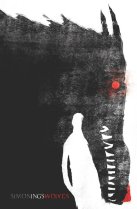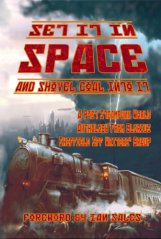Hot off the tinterweb’s ones and zeros, a pair of interviews of me have appeared today. Actually, it’s the same interview – in English and in Spanish. The Spanish version is on Leticia Lara’s Fantástica Ficción here, and the English version is on Odo’s Sense of Wonder here. It was fun doing the interview, and they asked some tricky questions.
Monthly Archives: January 2014
The first haul of the year
… Although, strictly speaking, this isn’t the first book haul of the year as it includes a few books I received for Christmas. But it’s certainly the first book haul post of 2014. I also seem to have gone a little mad in the past three weeks, and bought more books than usual – and some of which, I must admit, I’ve no idea why I purchased… Still, so it goes.
Some graphic novels to start: I liked Léo’s Aldebaran series so much (see here), I bought the follow on series, Betelgeuse: The Survivors, The Caves and The Other (and I’ve already written about them here). I’ll be picking up the next series, Antares, soon, although it’s not yet complete in the original French. Apparently, the English versions have also been censored, with underwear added onto nude characters. Orbital: Justice is the fifth in the space opera bande dessinée series, and while it looks great and has an impressively twisty plot, it does owe a little too much to big media sf.
Imaginary Magnitude, Fenrir and High-Opp were all Christmas presents. I’ve already read Fenrir – while I really liked Wolfsangel, I found this one a little too long for its story, and it didn’t really pick up until two-thirds of the way through. High-Opp is a previously-unpublished Frank Herbert novel; should be interesting. Europe in Autumn I have to review for Vector; and New Adventures in Sci-Fi is an early collection by one of my favourite sf writers, Sean Williams (it was also incredibly hard to find a copy).
These are the “wtf was I thinking?” books. Mostly. The Rose of Sarifal is a Forgotten Realms novel, which I normally wouldn’t touch with a bargepole a good kilometre or so in length, but Paulina Claiborne is, I am reliably informed, a pseudonym of Paul Park. Chauvinisto I spotted on eBay and it sounded so awful I couldn’t resist it. I’ve been picking up the Hugh Cook fantasies when I see them, as I’ve heard they’re quite interesting. The Wordsmiths and the Warguild is the third in the ten-book series, and also the third book I now own. The Red Tape War is definitely a wtf purchase; it was very cheap. The two Ted Mark novels, The Man from Charisma and Rip It Off, Relevant!, are 1960s 007 pastiches with added rumpy-pumpy. Or so I believe. Goodbye Charlie is the novelisation of a quite silly film from 1964 starring Debbie Reynolds and Tony Curtis.
Four hardbacks for the collection. I already have a first edition of Monsieur of course, but this one is signed. The first edition of The Jewel In The Crown was a bargain (first editions are normally not cheap at ll), as was the first edition of The Clockwork Testament, the third of Burgess’s Enderby novels. (I suspect the first, Inside Mr Enderby, will continue to elude me as it was originally published under the name Joseph Kell and first editions are hugely expensive.) Ghosts Doing the Orange Dance is a new novella in signed limited hardback by one of my favourite genre authors and published by PS Publishing.
I had a Women’s Press SF copy of Native Tongue but it was really tatty, so I gave it to a charity shop. But now I have a copy in really good condition. Zoline’s collection, Busy About the Tree of Life, I will be reviewing for SF Mistressworks (that has to be one of the worst Women’s Press covers, though). Having heard so much about Joyce Carol Oates, I decided to give something by her a go, and Man Crazy was the first book by her I stumbled across. I’ve been a fan of Paretsky’s fiction for many, many years – Breakdown is not her latest, there was one published last year, but it is the one before that. I’ve also been reading Grafton’s Kinsey Milhone series for a long time. I’m up to V is for Vengeance, but W is for Wasted was published last year. Only three more letters to go. What will Grafton do after that?
Three things that interest me: Brutalist architecture, and there’s lots of lovely photos of it in Concrete (I actually bought a copy for my brother-in-law for his birthday, and over Christmas I had a look in the book and liked it so much… I bought myself one); the Cold War, and Fear and Fashion in the Cold War, covers, er, fashion inspired by the promises of bases on the Moon and the threat of nuclear armageddon (see my The future we used to have posts for more); and finally, the works of Paul Scott, in this case his most famous work, the Raj Quartet, as the title Paul Scott’s Raj, er, indicates.
Lumières I bought on eBay for not very much because its introduction was written by Lawrence Durrell. The art in it is also very good. Lenae Day I stumbled across while researching Then Will The Great Ocean Wash Deep Above. She restages photographs from 1960s magazines with herself as the model, and accompanies them with autobiographical text. One of her shows was ‘Space Cadette’ and in it she restaged a photograph from Time Magazine of Mercury 13 candidate Rhea Hurrle preparing to enter an isolation tank (Day’s version here). So far, Day’s work has only been published as Day Magazine and Modern Candor, but she recently ran a kickstarter for her next project, based on invented 1930s movie studio Prescott Pictures – see here.
Soyuz: A Universal Spacecraft I bought specifically for research for my Gagarin on Mars story, but it’ll also go in the Space Books collection. N.F.Fedorov is research for a novel I’m working on, but it’s not going to be about what you think it might be about. Or something.
2014 Hugo thoughts
Yesterday, I decided to have a bash at a draft ballot for the Hugo Awards. This will be the first time I’ve ever voted in them – although I attended the 2005 Worldcon in Glasgow, it was all a bit last-minute and I didn’t join the convention until a couple of months before. I am not a big fan of the Hugos – as I’ve said several times before on this blog. It’s a popularity contest dominated by a bunch of people whose tastes I do not share – nor even their opinions on what genre is or should be. I also think the awards reflect a situation in science fiction and science fiction fandom that has not pertained for over thirty years, and it’s long past time some swift and brutal changes were made. But I can’t make those changes, and it’s all set up in such a way that changes are near-impossible to implement… However, I can use my ballot to make my position clear…
There are at present sixteen categories of award: novel, novella, novelette, short story, related work, graphic story, dramatic presentation (short), dramatic presentation (long), editor (long form), editor (short form), professional artist, semiprozine, fanzine, fancast, fan writer and fan artist.
First, I don’t think any award should go to a person. It should go to a work. So my ballot for both editor categories and both artist categories will read “no award”. I would do the same for fan writer, but I have my reasons for nominating people for that – on which more later.
Second, the novelette category is a completely fucking stupid waste of time. It’s a hangover from the days when magazines offered different pay rates for different word-lengths. The only venues where novelette is still used are the Big Three genre magazines: Asimov’s, Analog and F&SF. Once upon a time, they dominated the short fiction categories, but their day is long past and they’ve become increasingly irrelevant. Kill the novelette, kill it dead. Anything longer than a short story and shorter than a novel, I will be nominating as a novella.
I have never seen the point of the dramatic presentation categories. The film industry has enough awards of its own, and it really couldn’t give a shit about an award handed out by a tiny bunch of sf fans who meet up in a hotel once a year. Kill both categories, no one will miss them.
The semiprozine category is a joke. Q: when is a magazine not a magazine? A: when the Hugo Award, with Tory-like mendacity, keeps on redefining what is eligible for semiprozine and what is not. You can count the number of genre magazines with salaried staff in existence now on one hand. If it publishes genre fiction to a schedule, it’s a magazine – no matter what medium. And let’s not forget that a lot of original fiction also appears in anthologies. We really should have a category for them too: Best Original Anthology.
If the semiprozine category is risible, then the fanzine one is a living fossil. Recent years have seen a small handful of websites nominated in this category – which, it could be argued, are the twenty-first century equivalent. Except most genre websites are single-author, so their content would also make them eligible for fan writer. Yes, there are collaborative websites, such as past winner SF Signal, but as far as I’m aware there is no distinction made in the rules regarding the number of contributors. And really, isn’t a fanzine – ie, a voice in the genre conversation – just as much a related work as a non-fiction book from a reputable publishing house? (Assuming, of course, it’s about genre and not just some old farts whinging about the “good old days in fannish fandom”.)
The one people award in which I will be nominating is fan writer. As a political act. It’s a people award, it should be killed. But it’s also time the Hugo Awards ditched the whole fanzine thing and took serious note of where the genre conversation now takes place. Fanzines – paper fanzines – are completely fucking irrelevant and have been for decades. I will be nominating five bloggers, because I think the Hugo needs to get its arse in gear and recognise that fandom has moved online.
The two artist categories… They should award it for a piece of art, like the BSFA Award does. Does it matter if it was done by a pro or a fan? With people sourcing cover art from deviantart.com and so on, any kind of distinction between filthy pros who do it for the money and grubby fans who doodle for the boo has long since evaporated.
The nominations for the 2014 Hugo Awards close on 31 March. I still have plenty to read if I want to make reasonably informed choices for the categories in which I plan to participate. I’ll post my draft ballot in a few weeks. But don’t be surprised if “no award” appears rather a lot on it…
ETA
I know, comments on reddit… But when I saw the comment here by JW_BM, I couldn’t let the stupidity go unchallenged. They write of my “utter ignorance to the boom in novelette self-publishing”. What boom? And it’s “ignorance of” not “ignorance to”. Could they possibly mean all those novellas that people have self-published? Perhaps they don’t know the difference between a novella and a novelette. Perhaps they spectacularly missed the point I was making. Actually, there’s no perhaps about it. Sigh. I know, comments on reddit… I won’t even bother addressing the stupid remarks about the dramatic presentation awards. Rabid Dr Who fans? At a worldcon? I think they’ll find most Dr Who fans don’t even know what a worldcon is, never mind a Hugo Award. Bugger. Looks like I did reply, after all.
The future we used to have, part 22
There’s nothing new in imagining what the future might look like, and science fiction is far from the only artform with a monopoly on doing so. However, as the future becomes the present, so does our imagined future become part of our past. And here are a few illustrations of that process…
Houses of the future
Clothes of the future
Giant computer brains
10 question book meme
John DeNardo posted this on SF Signal on Saturday, and I’m a sucker for a book meme. I’ve a feeling I’ve done this one before but, you know, the answers would have been different then.
- The last sf/f/h book I read and liked was: A Tale for the Time Being, Ruth Ozeki. I’ve already nominated it for the BSFA Award, and I’ll be doing the same for the Hugo Award. I’d also be very happy to see it on the Clarke Award shortlist.
- The last sf/f/h book I read and wasn’t crazy about was: Palimpsest, Catherynne M Valente. I gave up about 100 pages in. I like lush prose – I collect Lawrence Durrell’s books, ffs. But the prose in this just rubbed me completely up the wrong way.
- The sf/f/h book I am reading now is: The Violent Century, Lavie Tidhar. There’s a whole bunch of 2013 novels I need to read before the nominations for the Hugo Award closes on 31 March 2014.
- The sf/f/h book(s) I most want to read next is/are: see above.
- An underrated sf/f/h book is: Most of the genre novels I rate highly are under-rated by other people, most of the genre novels I rate highly are currently out of print.
- An overrated sf/f/h book is: Where do I start? How about… anything by Neil Gaiman, or that regressive space opera series by James SA Corey?
- The last sf/f/h book that was recommended to me was: Ancillary Justice, Ann Leckie. And it was an excellent call. I take most recommendations with a pinch of salt, but this came from a number of trusted sources and the book’s blurb sounded like it might appeal.
- A sf/f/h book I recommended to someone else was: Ancillary Justice again.
- A sf/f/h book I have re-read is: My most recent reread, which probably doesn’t count, was John Varley’s Good-Bye, Robinson Crusoe – it’s reprint collection, so while I’d not read the book before, I had read every story in it previously. Otherwise, it was Sovereign by RM Meluch, back in June 2013, which I reviewed for SF Mistressworks here.
- A sf/f/h book I want to re-read is: White Queen, Gwyneth Jones. It’s been years since I last read it, and she is my favourite science fiction writer. Or perhaps Acts of Conscience, William Barton, as he was a writer I really liked and it’s been a long time since I last read one of his books.
Readings catch-up
And here we are, the last books I read during 2013. As usual, it’s quite a mix – some category science fiction, some literary fiction, and a handful of bandes dessinée. Make of them what you will.
 Exultant, Stephen Baxter (2004). This is the second book of the Destiny’s Children trilogy, and I quite enjoyed the first, Coalescent (see here), so I was expecting to enjoy this one too. But… oh dear. The earlier book had two main narratives, one set in the present day and the other in Ancient Britain. Exultant is set wholly in the distant future, when humanity is at war with the Xeelee, and has been for over a thousand years. A pair of teen soldiers become involved in a series of attempts to strike a final blow against the Xeelee, and destroy the huge black hole at the heart of the galaxy, called Chandra, which the Xeelee use as a base. The novel opens with fighter pilot Pirius escaping destruction by a Xeelee nightfighter through some “timelike curve” manoeuvre which results him and his crew travelling back in time several years. This is apparently not unusual on the front line – and because Pirius disobeyed orders, he is sentenced to serve in a penal battalion. His earlier self is also punished, even though he hasn’t done anything. Er, yet. But visionary Commissary Nilis (isn’t a commissary somewhere to buy food?) rescues the “innocent” Pirius from punishment and takes him to Earth to help with his crazy schemes to strike decisively at the Xeelee. Meanwhile, time-travelled Pirius experiences life as a ground trooper in the war against the Xeelee. This is science fiction as boy’s own adventure, with a side-order of Big Idea cosmology. Baxter leaves his story for chapters at a time to explain how the universe began – and, in the process, created races like the Xeelee. The characters are drawn with the broadest of strokes – Nilis is a stereotypical dotty old professor, even down to the lack of personal hygiene; a female aide is a stereotypical beautiful but cold bitch; Pirius and his girlfriend, Torec, are everyman teenagers. The way the war is prosecuted doesn’t seem at all convincing, the explanations for it and the Xeelee are dull, and the link with the preceding book is so tenuous it’s a stretch to consider this book a sequel. Exultant is sort of like distilled Baxter, but one where the distillation process has taken out all the stuff that makes most of Baxter’s works interesting. I’ll be reading the third book, Transcendent, but I’m not really looking forward to it.
Exultant, Stephen Baxter (2004). This is the second book of the Destiny’s Children trilogy, and I quite enjoyed the first, Coalescent (see here), so I was expecting to enjoy this one too. But… oh dear. The earlier book had two main narratives, one set in the present day and the other in Ancient Britain. Exultant is set wholly in the distant future, when humanity is at war with the Xeelee, and has been for over a thousand years. A pair of teen soldiers become involved in a series of attempts to strike a final blow against the Xeelee, and destroy the huge black hole at the heart of the galaxy, called Chandra, which the Xeelee use as a base. The novel opens with fighter pilot Pirius escaping destruction by a Xeelee nightfighter through some “timelike curve” manoeuvre which results him and his crew travelling back in time several years. This is apparently not unusual on the front line – and because Pirius disobeyed orders, he is sentenced to serve in a penal battalion. His earlier self is also punished, even though he hasn’t done anything. Er, yet. But visionary Commissary Nilis (isn’t a commissary somewhere to buy food?) rescues the “innocent” Pirius from punishment and takes him to Earth to help with his crazy schemes to strike decisively at the Xeelee. Meanwhile, time-travelled Pirius experiences life as a ground trooper in the war against the Xeelee. This is science fiction as boy’s own adventure, with a side-order of Big Idea cosmology. Baxter leaves his story for chapters at a time to explain how the universe began – and, in the process, created races like the Xeelee. The characters are drawn with the broadest of strokes – Nilis is a stereotypical dotty old professor, even down to the lack of personal hygiene; a female aide is a stereotypical beautiful but cold bitch; Pirius and his girlfriend, Torec, are everyman teenagers. The way the war is prosecuted doesn’t seem at all convincing, the explanations for it and the Xeelee are dull, and the link with the preceding book is so tenuous it’s a stretch to consider this book a sequel. Exultant is sort of like distilled Baxter, but one where the distillation process has taken out all the stuff that makes most of Baxter’s works interesting. I’ll be reading the third book, Transcendent, but I’m not really looking forward to it.
 Betelgeuse 1: The Survivors, 2: The Caves and 3: The Other, Léo (2000 – 2005). This is the direct follow-on from Léo’s Aldebaran series, and was originally published in five volumes: La planète, Les survivants, L’expédition, Les cavernes and L’autre. There are two more sequences, Antares, of which four of the five volumes have been published in English, and Les survivants, which currently comprises two volumes and neither of which has yet to be translated into English. Kim, one of the two teenagers who was invited to join the group of immortals in Aldebaran (see here), has spent the last few years studying on Earth. Now she’s back on Aldebaran, and is recruited to join an expedition to regain contact with a lost colony on a world orbiting Betelgeuse. On arrival at the planet, they find the colonists’ ship, but when they dock to it a computer virus destroys their ship’s systems. They descend to the surface, where they meet up with the surviving colonists – who, like on Aldebaran, have created a society in which women are second-class citizens, justified by both religion and a desperate need for population growth. But there is another group of colonists, led by the ship’s captain, who are more interested in investigating the world than subjugating women – and who the men from the first group blame for the computer virus. Kim finds herself caught between the two – the first group expect Kim to join their village and become yet another brood mare, but she’s there to discover what happened and why. It’s all tied in with the creature, the mantris, from the first series – another of its type exists on Betelgeuse, and is part of the life-cycle of the local animals known as “iums” (and who may actually be sentient). Kim learns their secret, solves the problem of the computer virus, but there is still a greater mystery to be solved. I picked up the Aldebaran series on a whim, but I must admit I’m enjoying these books. The art is good, the setting is interesting, and if Léo has a tendency to fall back on macho sexist pigs for his male villains, at least they get their just deserts. Good stuff.
Betelgeuse 1: The Survivors, 2: The Caves and 3: The Other, Léo (2000 – 2005). This is the direct follow-on from Léo’s Aldebaran series, and was originally published in five volumes: La planète, Les survivants, L’expédition, Les cavernes and L’autre. There are two more sequences, Antares, of which four of the five volumes have been published in English, and Les survivants, which currently comprises two volumes and neither of which has yet to be translated into English. Kim, one of the two teenagers who was invited to join the group of immortals in Aldebaran (see here), has spent the last few years studying on Earth. Now she’s back on Aldebaran, and is recruited to join an expedition to regain contact with a lost colony on a world orbiting Betelgeuse. On arrival at the planet, they find the colonists’ ship, but when they dock to it a computer virus destroys their ship’s systems. They descend to the surface, where they meet up with the surviving colonists – who, like on Aldebaran, have created a society in which women are second-class citizens, justified by both religion and a desperate need for population growth. But there is another group of colonists, led by the ship’s captain, who are more interested in investigating the world than subjugating women – and who the men from the first group blame for the computer virus. Kim finds herself caught between the two – the first group expect Kim to join their village and become yet another brood mare, but she’s there to discover what happened and why. It’s all tied in with the creature, the mantris, from the first series – another of its type exists on Betelgeuse, and is part of the life-cycle of the local animals known as “iums” (and who may actually be sentient). Kim learns their secret, solves the problem of the computer virus, but there is still a greater mystery to be solved. I picked up the Aldebaran series on a whim, but I must admit I’m enjoying these books. The art is good, the setting is interesting, and if Léo has a tendency to fall back on macho sexist pigs for his male villains, at least they get their just deserts. Good stuff.
 Unexploded, Alison MacLeod (2013). I saw this novel on the Booker Prize long list, and something about it seemed like it might appeal. So I bought a copy. And… well, it read a bit like a parody of your typical middle-class literary novel – a couple’s marriage slowly implodes, a child unwittingly betrays someone, which leads to a shocking end… The only difference is that the story is set in Brighton in 1940, much is made of some Brits’ admiration of Hitler (not to mention their blatant anti-semitism), and Virginia Woolf makes an appearance. The story is told chiefly from the point of view of the wife, Evelyn, who enters into an affair with a Jewish painter expelled from Nazi Germany as a “degenerate”, whom she first meets in the refugee camp – a de facto prisoner of war camp – superintended by her banker husband. Yet, for all that I enjoyed the book. MacLeod evokes her period well, the cast are beautifully-drawn, and there’s some lovely writing. If it’s all a bit obvious plot-wise, at least the narrative maintains your interest. I’m not entirely sure it belonged on Booker long list, however.
Unexploded, Alison MacLeod (2013). I saw this novel on the Booker Prize long list, and something about it seemed like it might appeal. So I bought a copy. And… well, it read a bit like a parody of your typical middle-class literary novel – a couple’s marriage slowly implodes, a child unwittingly betrays someone, which leads to a shocking end… The only difference is that the story is set in Brighton in 1940, much is made of some Brits’ admiration of Hitler (not to mention their blatant anti-semitism), and Virginia Woolf makes an appearance. The story is told chiefly from the point of view of the wife, Evelyn, who enters into an affair with a Jewish painter expelled from Nazi Germany as a “degenerate”, whom she first meets in the refugee camp – a de facto prisoner of war camp – superintended by her banker husband. Yet, for all that I enjoyed the book. MacLeod evokes her period well, the cast are beautifully-drawn, and there’s some lovely writing. If it’s all a bit obvious plot-wise, at least the narrative maintains your interest. I’m not entirely sure it belonged on Booker long list, however.
 A Tale for the Time Being, Ruth Ozeki (2013). This novel, of course, made it to the Booker short list, and it’s also one of those literary novels that makes free use of science fiction tropes. Unlike Exploded, its description didn’t especially appeal, but I stumbled across a secondhand copy on a table of books being sold for charity in, of all places, my local Wilkinson. So I bought and read it. And I thought it was very good. Perhaps comparisons with David Mitchell’s number9dream are inevitable – both are set (chiefly) in Japan, both have very chatty narrators – but I think A Tale for the Time Being is by far the better of the two books. And that’s not just because of its core conceit, or its framing narrative. It opens as the diary of a young Japanese girl, Nao, who has grown up in the US and, on the family’s return to Japan, no longer feels Japanese. She is bullied at high school, and her father can’t find a job and has tried to commit suicide. She documents her attempts to find herself – including spending a summer with her great-grandmother, a 104-year-old Buddhist nun, whom she idolises, but also a short period spent being paid for sex by men. The diary was discovered by a writer, Ruth living on a small island off the west coast of Canada. She thinks the diary is debris from the tsunami, and tries to contact Nao, only to discover she can find no trace of her or her family. Ozeki has thrown a lot into A Tale for the Time Being – not just Japanese culture and history, but also things like the Many Worlds Hypothesis, eco-terrorism, barnacles… There are footnotes and appendices. And it all works. Both Nao and Ruth are likeable and well-drawn characters, the mishmash of tropes actually gloms together to create an interesting story, and the prose is excellent throughout. Ozeki didn’t win the Booker – it went to Eleanor Catton’s The Luminaries (which is on the TBR) – but I would be happy to see it on the BSFA and Hugo shortlists this year.
A Tale for the Time Being, Ruth Ozeki (2013). This novel, of course, made it to the Booker short list, and it’s also one of those literary novels that makes free use of science fiction tropes. Unlike Exploded, its description didn’t especially appeal, but I stumbled across a secondhand copy on a table of books being sold for charity in, of all places, my local Wilkinson. So I bought and read it. And I thought it was very good. Perhaps comparisons with David Mitchell’s number9dream are inevitable – both are set (chiefly) in Japan, both have very chatty narrators – but I think A Tale for the Time Being is by far the better of the two books. And that’s not just because of its core conceit, or its framing narrative. It opens as the diary of a young Japanese girl, Nao, who has grown up in the US and, on the family’s return to Japan, no longer feels Japanese. She is bullied at high school, and her father can’t find a job and has tried to commit suicide. She documents her attempts to find herself – including spending a summer with her great-grandmother, a 104-year-old Buddhist nun, whom she idolises, but also a short period spent being paid for sex by men. The diary was discovered by a writer, Ruth living on a small island off the west coast of Canada. She thinks the diary is debris from the tsunami, and tries to contact Nao, only to discover she can find no trace of her or her family. Ozeki has thrown a lot into A Tale for the Time Being – not just Japanese culture and history, but also things like the Many Worlds Hypothesis, eco-terrorism, barnacles… There are footnotes and appendices. And it all works. Both Nao and Ruth are likeable and well-drawn characters, the mishmash of tropes actually gloms together to create an interesting story, and the prose is excellent throughout. Ozeki didn’t win the Booker – it went to Eleanor Catton’s The Luminaries (which is on the TBR) – but I would be happy to see it on the BSFA and Hugo shortlists this year.
 On a Red Station, Drifting, Aliette de Bodard (2012) I should have picked up a copy of this at the Eastercon, and I’m not really sure why I didn’t. Anyway, I rectified that error at Fantasycon. This is well-crafted heartland science fiction set in a Vietnamese universe. The story opens with the arrival of Linh on Prosper Station, after the rebels have taken the world which she administered as magistrate. But now she’s a refugee and dependent upon the kindness of distant relatives she has previously had little or no dealings with. It also transpires that Linh had written a letter to the emperor, criticising his conduct of the war with the rebels, and a faction at the court who share her sentiments have decided to use her in a play for courtly influence. Complicating matters is the fact she’s not welcome on Prosper Station, and that the station is having trouble coping with the refugees it has taken aboard. The story was apparently inspired by The Dream of the Red Chamber (AKA The Story of the Stone) by Cao Xueqin, one of China’s “Four Great Classical Novels”, and dating from 18th century. While I’m familiar with some classical Arabic literature, I’m not with Chinese – though I might well give it a go (like I really need more books to read…). Anyway, On a Red Station, Drifting was certainly worth the cover price, and I really must catch up with the other Xuya stories.
On a Red Station, Drifting, Aliette de Bodard (2012) I should have picked up a copy of this at the Eastercon, and I’m not really sure why I didn’t. Anyway, I rectified that error at Fantasycon. This is well-crafted heartland science fiction set in a Vietnamese universe. The story opens with the arrival of Linh on Prosper Station, after the rebels have taken the world which she administered as magistrate. But now she’s a refugee and dependent upon the kindness of distant relatives she has previously had little or no dealings with. It also transpires that Linh had written a letter to the emperor, criticising his conduct of the war with the rebels, and a faction at the court who share her sentiments have decided to use her in a play for courtly influence. Complicating matters is the fact she’s not welcome on Prosper Station, and that the station is having trouble coping with the refugees it has taken aboard. The story was apparently inspired by The Dream of the Red Chamber (AKA The Story of the Stone) by Cao Xueqin, one of China’s “Four Great Classical Novels”, and dating from 18th century. While I’m familiar with some classical Arabic literature, I’m not with Chinese – though I might well give it a go (like I really need more books to read…). Anyway, On a Red Station, Drifting was certainly worth the cover price, and I really must catch up with the other Xuya stories.
 Orbital 5: Justice, Sylvain Runberg and Serge Pellé (2012) The continuing adventures of the Human-Sandjarr diplomatic team comprising Caleb and Mezoke, though the last volume left them in a bad place – Caleb in a regenerative c0ma and Mezoke on trial for high treason. This is very much a continuation of the story, and quite confusing if you’ve not read – or can’t remember the plot of – the previous volumes. There’s lots of political manoeuvring going on, and it seems the Earth-based politics of earlier volumes is part of a much wider galactic conspiracy. There’s also a team of masked assassins wandering round, making matters worse. This is pretty much space opera bande dessinée, and if it feels relatively unexceptional in terms of world-building or the tropes it deploys, it at least presents a unique vision – through Pellé’s art – of its universe. On occasion it looks like it owes a little too much to media sf, especially Star Wars and Babylon 5, but the story is surprisingly twisty-turny for the subgenre and format. There’s a sixth book, Résistance, due out in French this year, and I expect Cinebook will follow with an English edition about a year later.
Orbital 5: Justice, Sylvain Runberg and Serge Pellé (2012) The continuing adventures of the Human-Sandjarr diplomatic team comprising Caleb and Mezoke, though the last volume left them in a bad place – Caleb in a regenerative c0ma and Mezoke on trial for high treason. This is very much a continuation of the story, and quite confusing if you’ve not read – or can’t remember the plot of – the previous volumes. There’s lots of political manoeuvring going on, and it seems the Earth-based politics of earlier volumes is part of a much wider galactic conspiracy. There’s also a team of masked assassins wandering round, making matters worse. This is pretty much space opera bande dessinée, and if it feels relatively unexceptional in terms of world-building or the tropes it deploys, it at least presents a unique vision – through Pellé’s art – of its universe. On occasion it looks like it owes a little too much to media sf, especially Star Wars and Babylon 5, but the story is surprisingly twisty-turny for the subgenre and format. There’s a sixth book, Résistance, due out in French this year, and I expect Cinebook will follow with an English edition about a year later.
 The Siege Of Krishnapur, JG Farrell (1973) And speaking of the Booker Prize, The Siege Of Krishnapur won it in 1973. I must admit I hadn’t realised this novel was forty years old when I started reading it, but it’s moot anyway as the story is set during the Indian Rebellion in 1857. The Collector, his family, a handful of officers and men from a nearby garrison, plus the remaining English residents and visitors from the town barricade themselves in the Collector’s Residence and are besieged for four months by the rebel sepoys. As expected, the food runs out after a couple of months – leading to an auction of all the foodstuffs the survivors have been hoarding, a number of attacks by sepoys take their toll on the defending soldiers, and then there’s an outbreak of cholera. To make matters worse, there are two doctors in the Residence, one who believes cholera is caused by a miasma, and a dour Scot who is much more progressive. The two hate each other, and differ widely in their treatments to injury and illnesses. The Collector himself is a progressive sort, very much taken with the many devices he saw on display at the Great Exhibition a couple of years earlier. Despite that, he is also very Victorian… which leads to one of the book’s stranger elements: the women are treated as either precocious pets, or perfectly capable of standing alongside the men and contributing to the defence of the Residence. Often, it’s the same woman which provokes these contradictory sentiments – such as Lucy, who had been “compromised” by an officer some weeks before the Mutiny kicks off; but despite feeling almost theatrically sorry for herself since her prospects have been reduced to zero, she proves to be made of sterner, and quite manipulative, stuff, and is one of the few women to play a major part during the siege. I don’t recall why I picked up this book to read – yes, I admire Paul Scott’s Raj Quartet a great deal, but this is set a century earlier and the Victorian age doesn’t appeal to me all that much (which is one reason why I’m not a fan of steampunk). And yet, I thoroughly enjoyed The Siege Of Krishnapur and thought it very good. I think I’ll even read some more Farrell.
The Siege Of Krishnapur, JG Farrell (1973) And speaking of the Booker Prize, The Siege Of Krishnapur won it in 1973. I must admit I hadn’t realised this novel was forty years old when I started reading it, but it’s moot anyway as the story is set during the Indian Rebellion in 1857. The Collector, his family, a handful of officers and men from a nearby garrison, plus the remaining English residents and visitors from the town barricade themselves in the Collector’s Residence and are besieged for four months by the rebel sepoys. As expected, the food runs out after a couple of months – leading to an auction of all the foodstuffs the survivors have been hoarding, a number of attacks by sepoys take their toll on the defending soldiers, and then there’s an outbreak of cholera. To make matters worse, there are two doctors in the Residence, one who believes cholera is caused by a miasma, and a dour Scot who is much more progressive. The two hate each other, and differ widely in their treatments to injury and illnesses. The Collector himself is a progressive sort, very much taken with the many devices he saw on display at the Great Exhibition a couple of years earlier. Despite that, he is also very Victorian… which leads to one of the book’s stranger elements: the women are treated as either precocious pets, or perfectly capable of standing alongside the men and contributing to the defence of the Residence. Often, it’s the same woman which provokes these contradictory sentiments – such as Lucy, who had been “compromised” by an officer some weeks before the Mutiny kicks off; but despite feeling almost theatrically sorry for herself since her prospects have been reduced to zero, she proves to be made of sterner, and quite manipulative, stuff, and is one of the few women to play a major part during the siege. I don’t recall why I picked up this book to read – yes, I admire Paul Scott’s Raj Quartet a great deal, but this is set a century earlier and the Victorian age doesn’t appeal to me all that much (which is one reason why I’m not a fan of steampunk). And yet, I thoroughly enjoyed The Siege Of Krishnapur and thought it very good. I think I’ll even read some more Farrell.
 A Possible Life, Sebastian Faulks (2013) Or rather, five possible lives. The first is a young man who joins one of the many secret agent services during WWII, is captured, ends up as a trustee at a death camp but escapes, and the rest of his life is changed by his experiences in Germany – even though he returns to his pre-War career as a teacher at a boarding school. A father sells his son to a workhouse, the son prospers, buys his way out, sets himself up in business, and eventually becomes a well-to-do (if somewhat shady) business in Victorian London. A young woman in Italy a decade or so hence is obsessed with discovering the biological source of human awareness (a fascination Faulks also clearly shares, given this and his novel Human Traces). An orphaned girl in nineteenth century provincial France lives an unexceptional life looking after a family’s children. A retired rockstar discovers a new talent and nurtures her career, becoming her lover and manager, but the pressure proves too much for her. Faulks’ ideas on human awareness are interesting, but there’s not enough connective tissue between the five stories to define that idea as this book’s central conceit or even give it structure. The writing is your standard Brit-lit-fic prose, and while the settings of some stories convince, others do less so – especially the rockstar one. All in all, a pretty weak effort.
A Possible Life, Sebastian Faulks (2013) Or rather, five possible lives. The first is a young man who joins one of the many secret agent services during WWII, is captured, ends up as a trustee at a death camp but escapes, and the rest of his life is changed by his experiences in Germany – even though he returns to his pre-War career as a teacher at a boarding school. A father sells his son to a workhouse, the son prospers, buys his way out, sets himself up in business, and eventually becomes a well-to-do (if somewhat shady) business in Victorian London. A young woman in Italy a decade or so hence is obsessed with discovering the biological source of human awareness (a fascination Faulks also clearly shares, given this and his novel Human Traces). An orphaned girl in nineteenth century provincial France lives an unexceptional life looking after a family’s children. A retired rockstar discovers a new talent and nurtures her career, becoming her lover and manager, but the pressure proves too much for her. Faulks’ ideas on human awareness are interesting, but there’s not enough connective tissue between the five stories to define that idea as this book’s central conceit or even give it structure. The writing is your standard Brit-lit-fic prose, and while the settings of some stories convince, others do less so – especially the rockstar one. All in all, a pretty weak effort.
 Good-bye, Robinson Crusoe, John Varley (2013). I’ve been a fan of Varley’s fiction since first stumbling across one of his short stories back in the early 1980s. A couple of those stories still remain favourites to this day, though neither are in this retrospective collection. But it was the fanboy in me who shelled out for this signed and numbered limited edition copy from Subterranean Press (who do lovely books), even though I have all but one story in other collections – and some of them in two collections. What Varley did back in the 1970s and and 1980s, he did very well – his novels from that period are still in print for good reason – and surprisingly many of his stories have withstood the test of time quite well – ‘Equinoctial’, for example, could have been written a handful of years ago. Some of the others fare less well – ‘The Unprocessed Word’ is a silly joke that probably wasn’t very funny when it was first published in 1986, and just feels quaint now. ‘Blue Champagne’ feels like a heartland sf story of its time; ‘In the Bowl’ still stands up; as does ‘Lollipop and the Tar Baby’, although a sentient black hole is a little, er, hard to swallow. In hindsight, this is a book for fans of Varley’s fiction. The most recent story dates from 1986, so it’s hardly an introduction to his current fiction (he has a new novel, Dark Lightning, out this year). If you want to see what Varley’s fiction is like, The John Varley Reader from 2004 is a better look at his career than this book, even if it’s not as attractive an object.
Good-bye, Robinson Crusoe, John Varley (2013). I’ve been a fan of Varley’s fiction since first stumbling across one of his short stories back in the early 1980s. A couple of those stories still remain favourites to this day, though neither are in this retrospective collection. But it was the fanboy in me who shelled out for this signed and numbered limited edition copy from Subterranean Press (who do lovely books), even though I have all but one story in other collections – and some of them in two collections. What Varley did back in the 1970s and and 1980s, he did very well – his novels from that period are still in print for good reason – and surprisingly many of his stories have withstood the test of time quite well – ‘Equinoctial’, for example, could have been written a handful of years ago. Some of the others fare less well – ‘The Unprocessed Word’ is a silly joke that probably wasn’t very funny when it was first published in 1986, and just feels quaint now. ‘Blue Champagne’ feels like a heartland sf story of its time; ‘In the Bowl’ still stands up; as does ‘Lollipop and the Tar Baby’, although a sentient black hole is a little, er, hard to swallow. In hindsight, this is a book for fans of Varley’s fiction. The most recent story dates from 1986, so it’s hardly an introduction to his current fiction (he has a new novel, Dark Lightning, out this year). If you want to see what Varley’s fiction is like, The John Varley Reader from 2004 is a better look at his career than this book, even if it’s not as attractive an object.
What did I nominate?
There’s an excellent post here by Adam Roberts, written with his characteristic perspicacity and wit, on awards and self-pimping. Now I must hang my head in shame, as I did post a little something of that sort back in December, but in my defence I’m just farting in a thunderstorm. (And Adam himself admits he’d thought The Eye With Which The Universe Beholds Itself was published in 2012, and I wanted to make people aware that it was actually out in 2013. Note to self: do not publish anything in January.) However, I was intending to post something here about what I’d myself nominated for the BSFA (and I will likely do the same for the Hugo), just as soon as I’d figured out what I was going to choose…
Each year, I tell myself I will read more short fiction, or I will read more books during their year of publication. Each year, I fail to do so. So it’s a rare year when I get to actually cobble together a list of nominations in all four BSFA categories – novel, short fiction, non-fiction, artwork – of reasonable length. This year, sadly, is no exception. So, for what it’s worth, these are what I’ve nominated so far…
Novel
Checking back over my records, I see I’ve read nineteen books published in 2013, but only six of them are genre novels. Which doesn’t give me much of a pool to nominate from – but the following are easily the best of those six, and I’d be happy to nominate them even if I’d read ninety books published in 2013.
- A Tale for the Time Being, Ruth L Ozeki (Canongate)
- Ancillary Justice, Ann Leckie (Orbit)
- God’s War, Kameron Hurley (Del Rey)
Short Story
At the start of the year, I made an effort to keep abreast of new genre short fiction as it was published – not just in the various online venues I regularly visit, but also the genre print magazines to which I subscribe – which would be, er, Interzone. Sadly, that effort didn’t last long. I did, however, read two genre anthologies published in 2013, and both contained some very good fiction.
- ‘A Bridge of Words’, Dinesh Rao (We See a Different Frontier, Fernandes & al-Ayad, Futurefire.net)
- ‘Golden Apple’, Sophia McDougall (The Lowest Heaven, Perry & Shurin, Jurassic London)
- ‘Selkie Stories are for Losers’, Sofia Samatar (Strange Horizons)
- ‘Build Guide’, Helen Jackson (Interzone)
As for the non-fiction and artwork categories… I’ll be spending this weekend trying to cobble together a short list of each to nominate (nominations close on Tuesday 14 January). And I have until 31 March to decide what I’m going to nominate for the 2013 Hugo Awards…
Reading resolutions for 2014
I’m going to try something new this year, and rather than just make lists of books I want to read, I’m going to be a little more flexible by applying a few rules instead. I don’t think any of these are especially onerous, so they should be pretty easy to stick to.
- Read 2014 books as soon as I can after purchasing them – there’s a few due this year I’d like to read (see here), so I just need to actually read them this year. This may mean reading earlier books in the series in order to catch up.
- Try to maintain a 50:50 male/female writer ratio – so after every book by a man I read, I have to read one by a woman (fiction only; non-fiction, graphic novels and anthologies don’t count).
- Read more translated fiction – I want to read the rest of Abdelrahman Munif’s Cities of Salt trilogy, I’d like to read more Elfriede Jelinek, I’ve also got books by Roberto Bolaño, Leila Aboulela, Naguib Mahfouz and Tove Jansson already on the TBR, but I’d also like to try fiction from countries whose literature I’ve yet to read.
I’ll also continue to document my reading – I’ve one last “recent reading” post for 2013 to come – and I’ll try to single out works I’m especially taken by, much as I have done in the past. I ought to do the same for films too – I made a start in 2012 with a series of films you must see posts, but have only managed to post two a year since then. Having said all that, I don’t want to give myself to much to do as, well, I’ve got a bit of fiction writing to do too – you know, research and write the fourth book of the Apollo Quartet, All That Outer Space Allows; I’m also keen to get started on a novel I want to write; and I have a whole bunch of short stories I really need to get finished.
Incidentally, nine days into the new year and I’ve already started as I mean to go on – after finishing MD Lachlan’s Fenrir, I started on Minaret by Leila Aboulela (her second novel, and the second by her I’ve read). Only another 356 days to keep this up…
Books to look forward to in 2014
I did something similar to this back in early 2013, though looking at that earlier post – see here – I note that I only managed to purchase 5 of the 15 books I mentioned, and only actually read one of them. And one of the books was postponed until 2014… This year I’ve managed to track down a few more titles that I’m looking forward to, though we’ll seen this time next year how many I’ve bought and/or read…
January
Ings, Simon: Wolves (Gollancz)
Roberts, Adam & Mahendra Singh: Twenty Trillion Leagues Under the Sea (Gollancz)
Smythe, James: The Echo (Harper Voyager) – the sequel to The Explorer, and the second book of what I see is now called the Anomaly Quartet.
February
Hutchinson, Dave: Europe in Autumn (Solaris)
March
MacLeod, Ken: Descent (Orbit)
April
Beckett, Chris: Mother of Eden (Corvus) – the sequel to the Clarke Award-winning Dark Eden.
Watson, Ian: The Uncollected Ian Watson (PS Publishing) – must admit I’m slightly puzzled by the title of this: “uncollected” – can there really be such a thing for a man who’s had thirteen collections published…
June
Roberts, Adam: Bête (Gollancz)
Shepard, Lucius: Beautiful Blood (Subterranean Press)
July
Baxter, Stephen: Ultima (Gollancz)- the sequel to Proxima.
Park, Paul: All Those Vanished Engines (Tor US) – a new novel from Park, is it possible to describe how much this excites me?
August
Park, Paul: Other Stories (PS Publishing)
Varley, John: Dark Lightning (Ace) – the final book of the quartet comprising Red Thunder, Red Lightning and Rolling Thunder.
September
Cobley, Michael: Ancestral Machines (Orbit) – a new set in the universe of the Humanity’s Fire trilogy.
Gibson, Gary: Extinction Game (Tor UK)
Mitchell, David: The Bone Clocks (Sceptre)
October
Leckie, Ann: Ancillary Sword (Orbit) – the second book of the trilogy, following on from Ancillary Justice.
Robson, Justina: The Glorious Angels (Gollancz)
Late in the year, date to be revealed
McFarlane, Alex Dally, ed.: The Mammoth Book of SF Stories By Women (Constable & Robinson)
Yes, there are no debuts there. Though there are several due out this year, I don’t know enough about them as yet to decide if they’re worth reading. Perhaps nearer their publication dates, some buzz will start to form among my online friends and acquaintances, and that may persuade be they’re worth a punt. That was, after all, how I came to read Ancillary Justice in 2013. Also, as the year progresses I will no doubt discover other new books I really want, much as I did in 2013. While new titles from major genre imprints are relatively easy to find, those from small presses aren’t; and I’ve no doubt missed out quite a few literary fiction novels by authors I really like, too.
ETA: I meant to add this before the post went live but forgot – the new Paul Park novel, All Those Vanished Engines, shares its title with an installation by sound artist Stephen Vitello, which includes “a commissioned text by local novelist Paul Park”. I don’t know what the link is between the novel and Vitello’s installation.
Popping up here and there in 2013
I meant to post this last weekend, but never managed to. Anyway, I didn’t spend all of 2013 reading, or reading for and then writing a book of the Apollo Quartet. I also managed to contribute some non-fiction here and there – and I don’t just mean reviews on SF Mistressworks, in Interzone, or here on my blog. Or the occasional article-ette/rant I posted here – on topics as diverse as An epistemological model of (speculative) fiction, gateway sf books, and deep sea exploration and deep sea exploration in science fiction. In fact, I did the following…
January
I contributed to The Books We Didn’t Love mind meld on SF Signal.
February
I gave a talk at the National Space Centre, with Chris Becket and Philip Palmer. See here.
April
I spoke about “the science in science fiction” to the University of Sheffield Natural History Society. See here (includes the text of my talk).
July
I contributed to The Successors of Orwell’s 1984 mind meld on SF Signal.
I also contributed to the Great SF/F Stories By Women mind meld on SF Signal, which was prompted by my 100 Great Science Fiction Short Stories by Women list on my blog.
And I wrote an introduction to Set it in Space and Shovel Coal into it, an anthology of steampunk(-ish) fiction by the Sheffield SFF Writers’ Group.
September
I contributed to the What’s On Your Mount To Be Read Book Pile mind meld at SF Signal.
November
I wrote a guest post on Why I Turned My Back On The Masters for the Nerds of a Feather blog.
I also wrote a guest post on Women in Science Fiction for the Little Red Reviewer blog.
December
I wrote a guest post on Iain Banks for Fantástica – Ficción – they were kind enough to translate it into Spanish. The post includes a never-seen-before photograph of Banks I took at the 1990 Eastercon in the Adelphi Hotel in Liverpool.
And I guest-edited issue 61 of Focus, “the British Science Fiction Association’s magazine for writers”, on the topics of self-publishing and social media. Contributions were provided by Geoff Nelder, Gary Gibson, William King, Tony Ballantyne, Colin Tate, Keith Brooke, Vaughan Stanger, Darren Nash, Joyce Chng, RB Harkness, Berit Ellingsen, Jonathan McCalmont, Del Lakin-Smith, Donna Scott, Danie Ware and Helen Arney.































